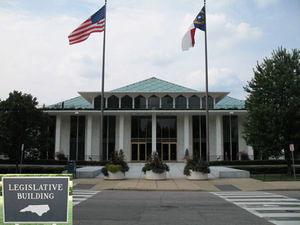School choice supporters in North Carolina will have to wait at least another year to see their top priorities voted on by the General Assembly after legislators begged off raising the state’s charter school cap and passing an education tax credit during the short summer session.
Disappointed by legislative leaders’ lack of action, school reform groups already are looking forward to November, when they hope electoral gains will lead to a more responsive atmosphere in the legislature in 2011.
“We have to communicate to the general public not only what has happened in the short session, but more importantly what has not happened, so that they will be better informed to take the proper action come November,” said Darrell Allison, president of Parents for Educational Freedom in North Carolina.
Limit Stays at 100
School reformers had hoped the legislature’s Democratic leadership would ease the state-imposed 100-school cap on charter schools, which are public schools that have more freedom to set curricula and hire and compensate staff than traditional district schools. Instead, lawmakers passed Senate Bill 704 allowing local school boards to incorporate charter-like elements into low-performing traditional public schools.
A Republican-sponsored amendment to let top-tier charter schools open new schools without counting against the cap was rejected.
Gov. Bev Perdue (D) had requested SB 704 in advance of the June 1 application deadline for a second round of federal Race to the Top grants, allocated partly on the basis of a state’s friendliness to charter schools. Despite the failure to pass SB 704, the state was among 19 Race to the Top finalists named in July. The state was a finalist but failed to secure any funds in round one, announced in March.
SB 704 garnered the support of the North Carolina Association of Educators, the state’s largest teacher union. Brian Lewis, the association’s government relations manager, said his group helped shape the bill and signed off on the final version.
“We’ll see how it plays out over the next five years,” he said.
Defeated ‘at 11th Hour’
Lawmakers also passed SB 1201, a measure allowing certain traditional high schools to operate under the same rules as charter schools.
The closest charter school advocates got to meaningful reform was House Bill 856, which would have raised the cap to 106 schools. It passed the House nearly unanimously last year but was halted in the Senate Education Committee.
“At the 11th hour, literally hours before the last committee hearing in the Senate, that bill was pulled,” Allison said. “That was quite disappointing.”
Even HB 856 was “a mixed bag” for school reformers, Allison said, since it would have imposed new performance restrictions on existing charter schools. He called those requirements “unfair” because many charter schools serve at-risk student populations who perform at a lower level.
David N. Bass ([email protected]) is an associate editor of Carolina Journal, published by the John Locke Foundation in Raleigh, NC, where this article first appeared. Reprinted by permission.

